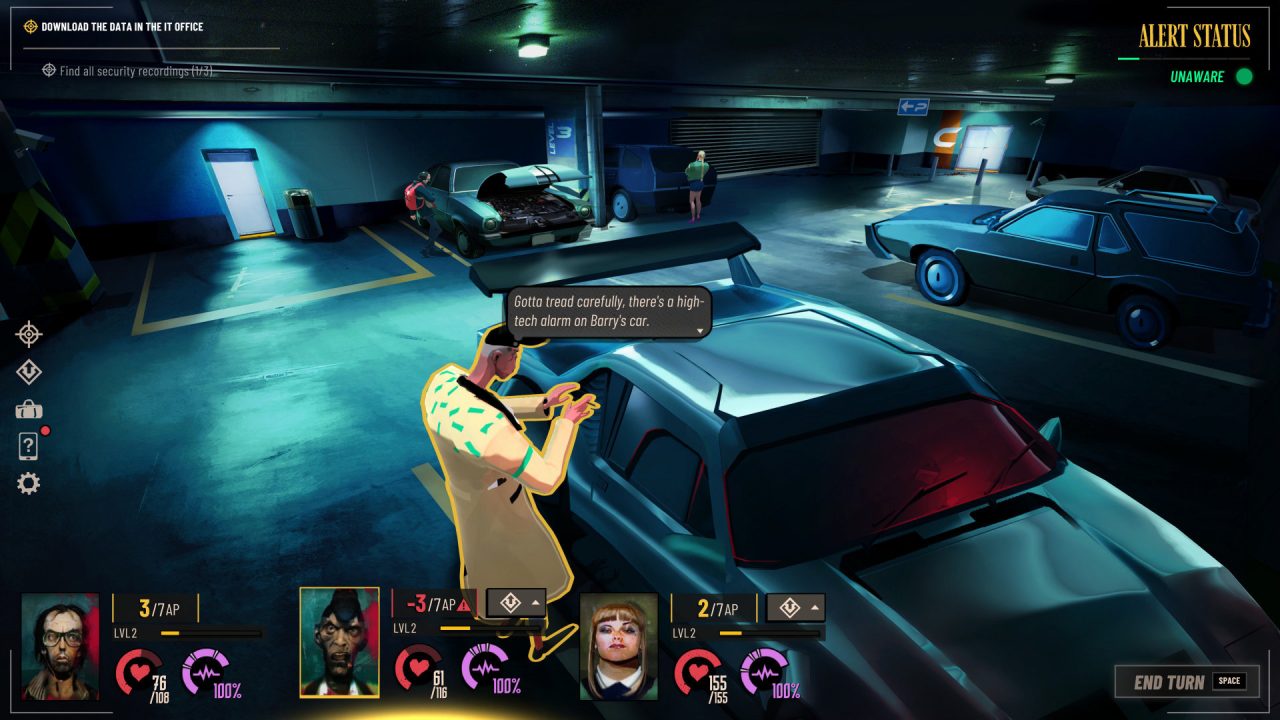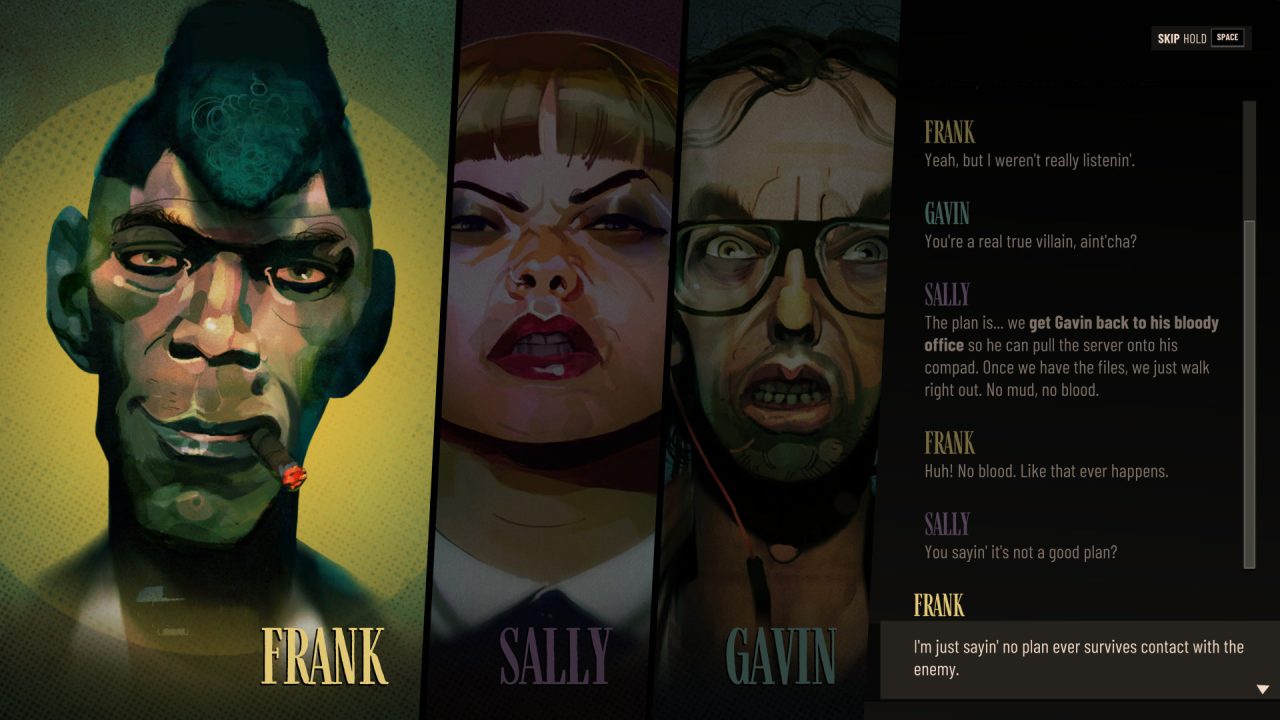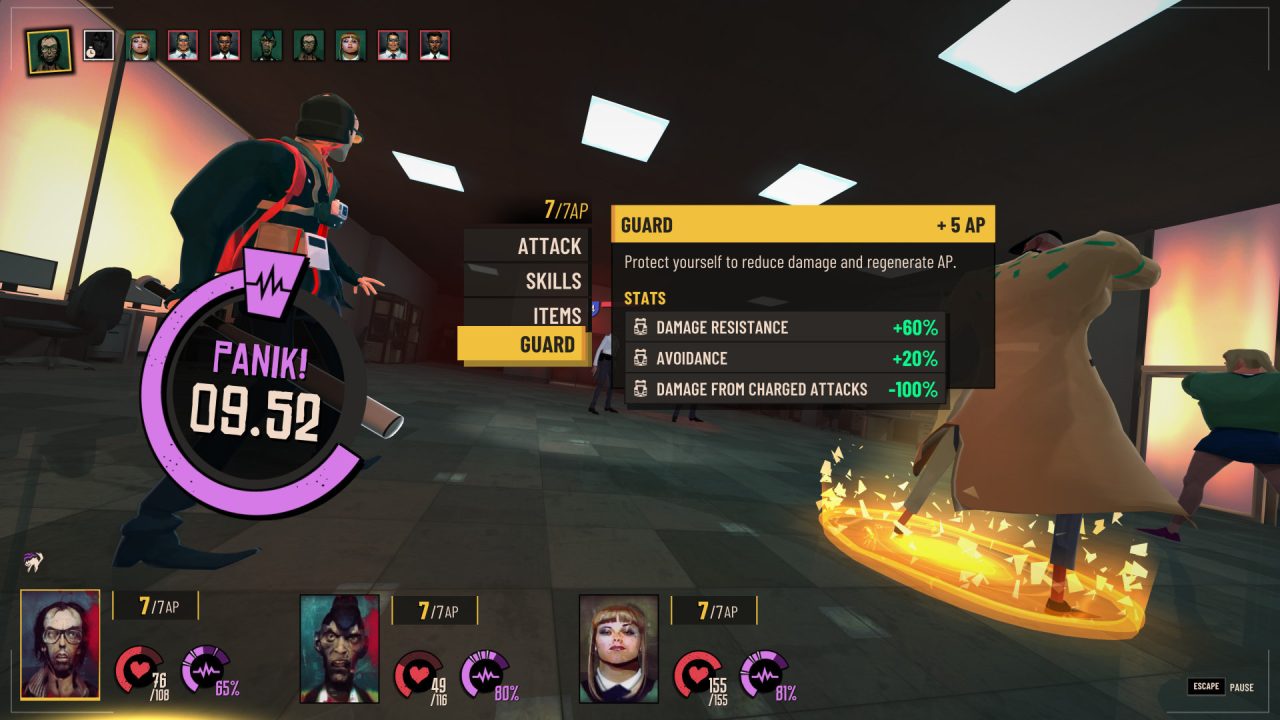Rain. Smoky pub. It’s London in the ‘70s — the 2070s. Frank Butcher has been in the game a long time, but he can’t remember the last time he hit on a score. His handler, Sally Wheeler, says this new guy Gavin Dorsey has the inside line on the biggest game in the British Isles: Hogan Industries. The mega-conglomerate owns the offices, the food, the sports, the mafia, the booze. But it doesn’t yet own the pub. That’s where Frank and Sally conduct business. Surely, there’s gotta be something of value in the company’s ivory tower. But Frank and Sally are about to find more than they bargained for.
Sunday Gold is a “turn-based point-and-click” adventure. In practical terms, it’s both fully point-and-click and fully turn-based RPG, based in a near-cyberpunk future. The success of Disco Elysium opened a path for further experimentation in merging these two genres. Though the two games could have a similar description, Sunday Gold takes quite a different road than Disco Elysium, aside from similarly dystopian settings.
The trio of gangsters (OK, two gangsters and Gavin) living in Sunday Gold‘s corporately owned England see Hogan Industries as a gigantic glaring target. It’s an eerie reality the ultrawealthy elitist Kenny Hogan has constructed, dominating the public consciousness through his total control of the markets and media. His bloodsport King’s League involves reanimated dogs patched together again to do battle with one another, and it’s a too-common topic of conversation among the citizenry. Hogan is developing a slavish following from a public lulled into a stupor of entertainment and alcohol. With newly former employee Gavin falling in their lap, Frank and Sally see their opportunity — nay, their duty! — to take Hogan down a notch or two and rob the rich to pay… themselves. Maybe the keycard to the office won’t work anymore, but Gavin’s a computer geek, and he’ll know his way around once they get inside.

To break down the gameplay, Sunday Gold is, on one hand, a full point-and-click adventure with everything you’d expect from that genre with a turn-based twist. You control not one, but three quirky characters; you also pick up a wide variety of random objects to use in massive, multiple-screen puzzles for often similarly random purposes, and I mean that as a positive. The difference is that you’re bound to an Action Points system (as described by Caitlin Argyros in her informative preview of Sunday Gold). While exploring, each of the three characters in your party can perform actions — some of which require using AP — until they’re out of AP, ending your turn, and then the enemy takes its “turn.” The alert status may go up or down, and the worse it is, the more likely you are to encounter some sort of guards whom you’ll need to fight in the RPG portion of the game. As far as classic point-and-click games go, Sunday Gold is much more LucasArts than Sierra, as the general vibes reminded me most of Sam & Max, though without the anthropomorphic animals. Thankfully, Sunday Gold makes it obvious which actions are possible and available to you given your current inventory, so you don’t spend time trying every random object you have on other random objects to proceed. The puzzles tend to be on the easier side, with the general challenge being remembering in which other part of this vast area the new bauble you found will be of use.
Complementing the point-and-click side is a full, meaty, turn-based RPG with everything you’d expect from that genre. Experience points, leveling up, equipment, healing items, and upgradable special skills are all part of the game. Combat is pretty standard fare for a turn-based RPG with a couple of quirks — one of them being the AP system — which carries over from the point-and-click half. Typically, a standard attack requires 1 AP. The game skips any sort of MP system, instead making special skills cost more than 1 AP and sometimes a “casting” delay of a turn or two. When your characters run out of AP in battle, they can then guard, replenishing some AP, and being a 100% effective block against enemies’ special attacks. Some of the skills are also usable in the point-and-click portion of the game, so that’s one aspect that needs consideration when working on loadout. You can respec your characters when they return to the pub between missions, but there aren’t many opportunities to do that.
There’s also the characters’ panic level. Whenever they get spooked by something while sneaking around places where they don’t belong, they lose composure. If their composure falls low enough, the time you have for their turns in battle drops from infinite to a matter of seconds. So, you want to keep your characters feeling mentally healthy as well as physically. To keep your characters on the level, you can have them do drugs. Stims restore hit points and temporarily raise AP allotment, though epinephrine offers a bigger boost in those areas. Tranquilizers and booze help regain composure. Hey, it’s hard times out here in London, so you do what you have to to get by.

The dystopian aspect of Sunday Gold and villain Kenny Hogan’s schemes don’t amount to much new in terms of narrative. Still, Frank, Sally, and Gavin make a lovely trio, each bursting with personality and leading to plenty of fun, quippy banter between the three. As a novice at the crime game, Gavin has a propensity to freak out easily, which can make him a liability. Frank, whose body makeup has to be 60% whisky and tobacco residue, reminded me of Buster Poindexter, for some reason; maybe it’s the pompadour. Though he’s the leader, his temperament tends to run hot, hot, hot. Thankfully, Sally is the cool-headed one, doing the rational thinking and the planning. In terms of RPG classes, they’re all odd combinations of typical archetypes. Frank is the leader with support skills, though he’s also a warrior with strong attacks, making him a good all-around combatant. Sally is the group’s muscle and serves simultaneously as a brute and a healer. Finally, Gavin is a technical wizard with techy skills who specializes in damaging multiple enemies at once.
As I alluded to, the AP system is the glue that holds the two halves of Sunday Gold together. While it kind of works, it gets a little wonky at times. It makes sense that figuratively being on the clock (not in real-time, of course) with limited actions per turn would behoove you to be more efficient or intuitive in trying to make progress to avoid getting into too many battles. The added pressure would spice up the more relaxed LucasArts-style game without becoming a brutal death-around-every-corner Sierra game. However, in my experience, I would eventually get stuck, which is inevitable in point-and-click games. Then I’d try every seemingly random action available to me anyway, throwing caution to the wind because I wouldn’t know how else to proceed. On the RPG side, if your characters finish the battle with low AP, that then carries over to the exploration portion, leaving you with little ability to do anything except end the turn, which likely leads directly into another battle. There were some unlucky instances where I got stuck in a loop of three or four battles in a row, especially as I got closer to the end. And in combat, actions and special skills often cost so much AP that there’s no more efficient means of fighting, at least in terms of conserving AP. It was a valiant effort by the developers to merge the two systems, but the overall game is too awkward to love.
As Caitlin wrote, Sunday Gold has a colorful comic book flair that also hearkens back to LucasArts games with richly saturated and cartoonishly detailed ’90s-style environments. Thankfully, you don’t need to do nearly as much scanning the screen with your mouse for interactive objects as in other point-and-clicks. There isn’t much in the way of animation, unfortunately. Sometimes, actions are depicted through still comic book-style panels, which pump in some wild energy and convey the emotion and personality of the characters.

The music is endlessly funky and too cool for school, which is good because Frank probably never graduated from school. The lively, snappy voice acting brings out the characters’ personalities with quick back-and-forth lines similar to a David Fincher or Guy Ritchie movie. There’s not much to say about the controls, but you can’t have pointing and clicking without a mouse, which works just fine. Unfortunately, the real-time minigames, especially the lockpicking one, are real twitchy and might be better suited to a controller, though that’s not an option.
Ultimately, Sunday Gold is a moderately successful experiment that could use further tweaking. The style, characters, and dialogue are cool and fun enough to lift a more familiar story. Mashing these two genres could be a worthy cause; though Sunday Gold makes a valiant attempt, it doesn’t quite kickstart the revolution. It may not be the top dog in the King’s League, but Sunday Gold is a contender.


